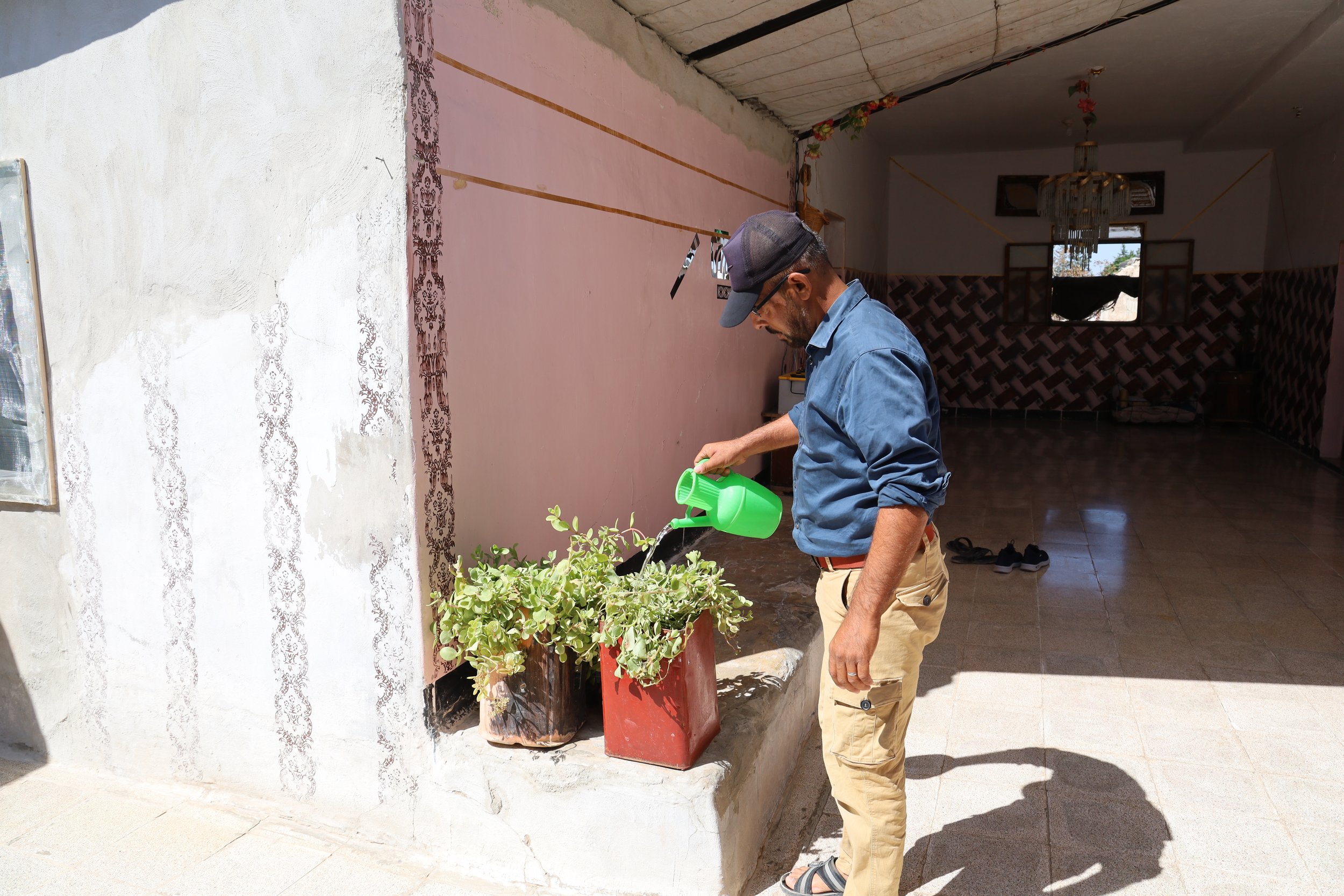The Role of Cash-for-Work in Early Recovery
At SARD, Cash‑for‑Work (CFW) is more than a temporary income opportunity. It is a core element of our early recovery and rehabilitation approach. Rather than a standalone intervention, CFW is integrated into our efforts to rebuild essential services and strengthen community resilience.
Through rehabilitation of schools, markets, sewage systems, and water networks, CFW engages vulnerable individuals to participate directly in restoring their communities while earning income with dignity.
Female CFW participants weed and plant new flowers in Sarmada Park for Earth Day.
Umm Mohammad’s Story
Umm Mohammad, a mother of four living in a displacement camp in Azaz, had struggled for years to support her family after a battery explosion severely damaged her eyesight, leaving her unable to continue agricultural and handicraft work. With no consistent assistance and growing hardship, she faced immense pressure as the sole provider.
Umm Mohammad secures the flap to her tent as she prepares to welcome visitors.
Her situation changed when she joined SARD’s Cash‑for‑Work program under the MAKANI: Integrated Sustainable Action for Longer‑Term Dignified Living Conditions project, funded by the Syria Cross‑Border Humanitarian Fund. The project provided four months of temporary employment for 65 vulnerable individuals, including women and people with disabilities, offering a monthly wage of $150. For four months, Umm Mohammad worked on community tasks such as cleaning mosques, parks, and schools.
“It was one of the most wonderful job opportunities I’ve ever had. The work was comfortable, and they treated us like family.”
The income provided immediate relief.
“The salary helped me a lot I was able to pay off my debts and buy food, clothes, and medicine for my family, along with other basic needs. I also bought things for my daughters that I couldn’t afford before. ”
The project did more than improve her finances it restored her sense of independence. The work also brought her into a supportive social environment, helping her cope emotionally with her circumstances.
Ibrahim Al‑Malla’s Story
In rural Aleppo, 42‑year‑old Ibrahim Mohammad Amin Al‑Malla lives with his family of twelve. For years, Ibrahim has suffered from severe kidney failure requiring regular dialysis, and multiple war‑related injuries that left him unable to perform most types of work. With no stable income and fully responsible for his family, Ibrahim experienced both financial crisis and deep emotional strain.
“My financial situation was extremely difficult, and my health was deteriorating. I suffer from kidney failure and have an injury, which makes it impossible for me to work. I cannot afford the treatment I need. I have a family who depends entirely on me, yet I am unable to provide for them. This has taken a heavy toll on my mental state. Being sick, unable to work, and unable to support your loved ones is one of the hardest feelings in life.”
Unable to secure work due to his illness, Ibrahim found himself trapped in a cycle of declining health and growing despair, until he learned about SARD’s Cash‑for‑Work program under the MAKANI initiative.
“I registered through their link and, thankfully, I was accepted. During my interview, I explained my health condition. Through the Cash‑for‑Work program, SARD gave me a chance. They offered me light, comfortable tasks that considered my health, like cleaning, planting trees, caring for them, and watering crops.”
The role was adapted to his physical ability, ensuring he could work safely. With his monthly $150 income, Ibrahim began paying for medication, accessing treatment, and improving his diet as required for kidney care. The impact was remarkable — his dialysis sessions decreased from three times a week to once every two weeks.
Ibrahim waters his plants in front of his home after a day working in SARD’s CFW program.
“Every time I planted or watered a tree, I felt both a deep sense of joy inside and psychological comfort. This opportunity allowed me to visit the doctor, buy my medicine, support my family, and meet our needs. My life started to improve financially, physically, and emotionally. I feel as if a heavy burden has been lifted off my shoulders.”
With renewed health, Ibrahim also regained dignity and connection, re‑engaging socially after years of isolation.
“I am deeply grateful to SARD. I hope they continue these projects so I can keep receiving treatment, remain able to work, and contribute to rebuilding our country.”
Ibrahim’s journey reflects the transformative impact of accessible livelihood opportunities — demonstrating how Cash‑for‑Work not only supplies income, but restores dignity, community connection, and hope for a better future.
How does CFW support recovery?
• Providing immediate income to vulnerable households, allowing families to meet basic needs such as food, medicine, and rent.
• Empowering individuals through dignified work. Participants earn income through their own efforts rather than relying solely on aid.
• Creating employment and livelihood opportunities for women, people with disabilities, and those who face barriers to traditional work.
• Restoring critical infrastructure and services in local communities.
• Strengthening local markets and reducing long‑term dependence on humanitarian support.
• Increasing resilience by supporting households and communities to rebuild safer, healthier living conditions.
UN staff speak with SARD Cash-for-Work participants who contributed to the rehabilitation of the recently restored school in Sheikh Ahmed, Syria.
Are you interested in support our CFW program or Early Recovery work? Please contact us at info@sardngo.org or donate today.










